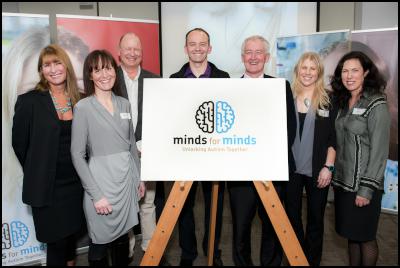Kiwi Team seeking DNA to unlock mysteries of autism
PRESS RELEASE
14 August 2013
Kiwi Team seeking DNA to embark on a quest to unlock mysteries of autism
A group of New Zealand scientists are chasing down the causes of ASD (autism spectrum disorder). Part of this work is seeking DNA from kiwis affected by ASD in an effort to uncover the keys to autism.
In launching the ambitious and groundbreaking research, the local team join the international race to find the underlying biological causes for ASD, a life-long condition which is estimated to affect 45,000 New Zealanders.
With some world-renowned geneticists at the helm, the local team believe they have as good a chance of making a breakthrough as their international counterparts.
The “Minds for Minds” campaign, created by WhybinTBWA, launched at The University of Auckland’s Centre for Brain Research on Monday evening and aims to encourage all New Zealanders on the spectrum to register on their database. Some will then be contacted to have their human genome sequenced.
The success of the project will rely on public fundraising for the sequencing and analysis of the DNA. At a cost of between $1000-$3000 per individual, an initial target of 1 million dollars has been set to enable the sequencing to happen.
It’s hoped the analysis will help researchers understand the complex condition responsible for a broad spectrum of behavioural and intellectual disabilities. Far from the Hollywood image of autistic people having genius talents as seen in “Rainman”, most diagnosed with ASD have intellectual impairment, may not be able to speak and many will not be able to live independent lives.
The multi-disciplinary research team includes distinguished geneticist Professor Russell Snell who was part of the team successful in isolating the gene for Huntington’s disease and the subsequent transgenic sheep model. Joining him is Dr Jess Jacobsen who’s been repatriated by the Neurological Foundation of New Zealand from Massachusetts General Hospital and Harvard Medical School to work on the project. Dr Jacobsen was last year awarded a prestigious Rutherford Discovery Fellowship to fund her research into the genetics of ASD.
The team also includes biologist Dr Johanna Montgomery whose research into the connection between brain proteins and autism hit the headlines late last year.
Microbiologist Dr Mike Taylor, functional biologist Associate Professor Klaus Lehnert, developmental neuropsychologist Associate Professor Karen Waldie, cognitive neuroscientist Professor Ian Kirk and clinical neurologist Dr Rosamund Hill, who has a profoundly autistic son, make up the team.
Professor Snell said he is optimistic his team can contribute considerably to the worldwide collaborative effort to find the genetic basis for autism, leading to a positive diagnostic or prognostic test and ultimately treatments for some families.
“This is not pure research or just for geeks; I see this work very much as a way of practically making life easier for families or individuals dealing with autism. In our best dreams patterns may be seen and people will be better disposed to learn what is ahead for them. It doesn’t have to end up with a drug. There are other levels of outcome,” Professor Snell said.
Neurologist Dr Rosamund Hill, who has a 10 year old profoundly autistic son, said parents of children with ASD were often in the dark about what was ahead for their children.
“It would be great if we could say these genetic changes in your child mean this is likely to be the course of their condition as opposed to they have autism but we have no idea what that will mean in the long term,” Dr Hill said.
www.mindsforminds.org.nz

Photo: l-r
Assoc
Prof Karen Waldie, Dr Johanna Montgomery, Prof Ian Kirk, Dr
Mike Taylor, Prof Russell Snell, Dr Jessie Jacobsen & Dr
Rosamund HillENDS


 Burnett Foundation Aotearoa: S.L.U.T.S Might Be The Answer To Ending Syphilis Outbreak
Burnett Foundation Aotearoa: S.L.U.T.S Might Be The Answer To Ending Syphilis Outbreak Aotearoa Covid Action: Pharmac Urged To Widen Access To Covid Vaccines
Aotearoa Covid Action: Pharmac Urged To Widen Access To Covid Vaccines Howard Davis: Dick Frizzell’s Hastings & Studio International Revisited In Wellington
Howard Davis: Dick Frizzell’s Hastings & Studio International Revisited In Wellington Heritage New Zealand: New Education Resource On Ōtūmoetai Pā Released
Heritage New Zealand: New Education Resource On Ōtūmoetai Pā Released Bowel Cancer NZ: Broken Promise, Lost Lives - Govt’s Bowel Cancer Screening Pledge 98% Undelivered
Bowel Cancer NZ: Broken Promise, Lost Lives - Govt’s Bowel Cancer Screening Pledge 98% Undelivered NZFC: Apply For The New Zealand Film Commission’s He Kauahi Catalyst
NZFC: Apply For The New Zealand Film Commission’s He Kauahi Catalyst 